“Bread and Circuses”
Written by Gene Roddenberry and Gene L. Coon
Directed by Ralph Senensky
Season 2, Episode 14
Production episode 60343
Original air date: March 15, 1968
Stardate: 4040.7
Captain’s log. The Enterprise has found debris that appears to be the remains of the S.S. Beagle, which has been missing for six years. Spock detects no bodies, so it’s possible the crew got to safety somewhere. Chekov computes the drift pattern of the debris and Spock traces it to the fourth planet of system 892.
The Beagle‘s shipmaster was R.M. Merik, who went to the Academy with Kirk, but who washed out in his fifth year and went into the merchant service.
The planet in question is Class M, appears to be early-to-mid-twentieth century equivalent in terms of technological development. Uhura is picking up amplitude and frequency modulations (AM/FM radio!), as well as TV broadcasts (she refers to it as something that used to be called “video,” and Spock pedantically corrects her by saying it was usually referred to as “television”). She picks up a news report of treasonous behavior among slaves, who are taken away and arrested. The sports report shows gladiatorial arena combat. The announcer mentions a bout in which a barbarian named William Harrison was killed, and Spock comments that Harrison was a member of the Beagle crew.
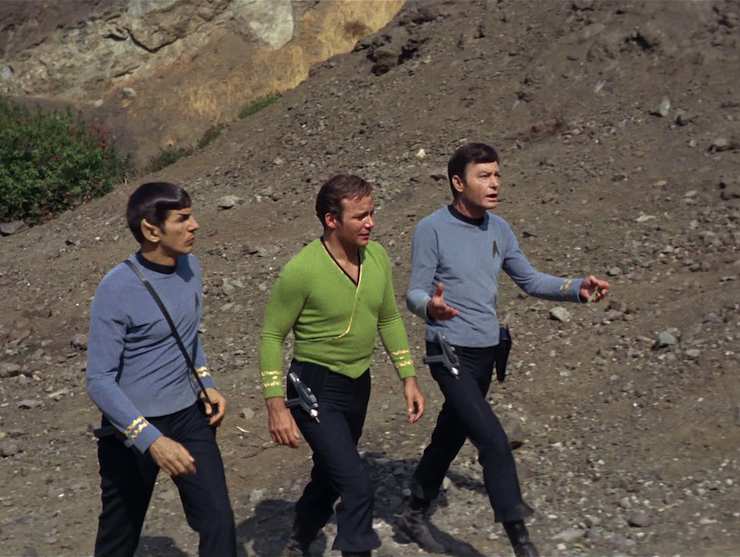
Kirk, Spock, and McCoy beam down to a hilly region outside the city where the TV broadcast came from. Because the Beagle was the first Federation ship to come out here, the Prime Directive is in full effect: no interference with the world, and no reference to space or the fact that there are other worlds with people on them.
The landing party is ambushed by four people with rifles, who speak colloquial twentieth-century English. Flavius, the leader of this foursome, wants to kill them, but brings them instead to his boss, Septimus, an older man who preaches peace. McCoy assures him that they’re peaceful as well, but Flavius doesn’t believe them.
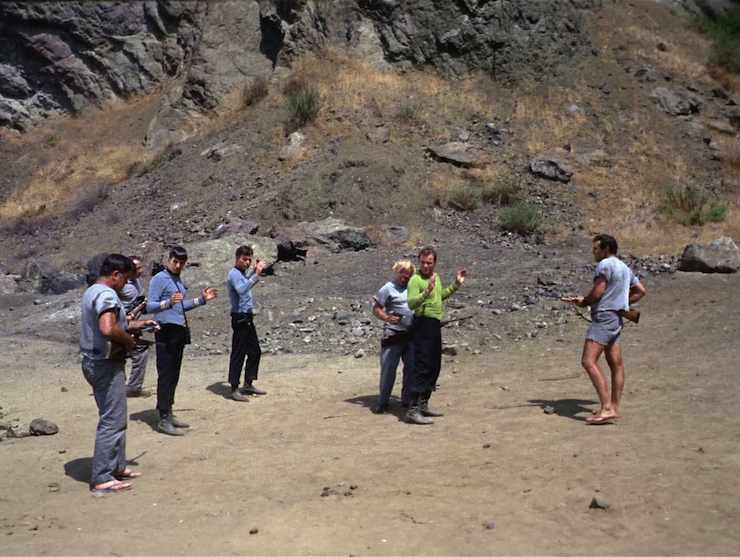
Spock explains that they’re seeking others similar to them: 47 who went missing six years ago. Flavius keeps insisting on killing the landing party, even though killing is wrong, because of the risk. The landing party found their hiding place.
Kirk contacts the Enterprise, and Scotty reveals that there are twelve people standing in their area. Septimus is impressed, and is now convinced that they’re not Romans, as the Romans don’t have any technology like that.
Septimus leads them to a cave system where his ragtag group of runaway slaves hide out from the Romans. Septimus himself used to be a senator, but he stopped worshipping the Roman gods like Jupiter and Mercury and changed to a more monotheistic worship that appears to be of the sun.
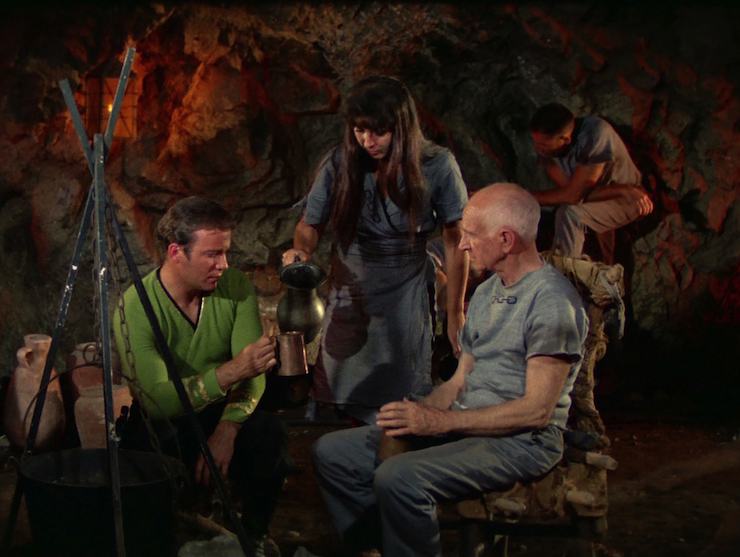
Kirk asks about Merik, and that gets everyone’s attention. Merikus is the First Citizen of Rome, who has been Lord of the Games for almost six years. The slaves do not think highly of him. Kirk explains that if he is First Citizen, he’s violated their people’s highest law and he must be punished.
Flavius agrees to guide them to the city, and Septimus will provide them with appropriate clothes. As they travel, Flavius tells his own story: he used to be one of the finest gladiators in the arena, but he too found religion and embraced peace over fighting.
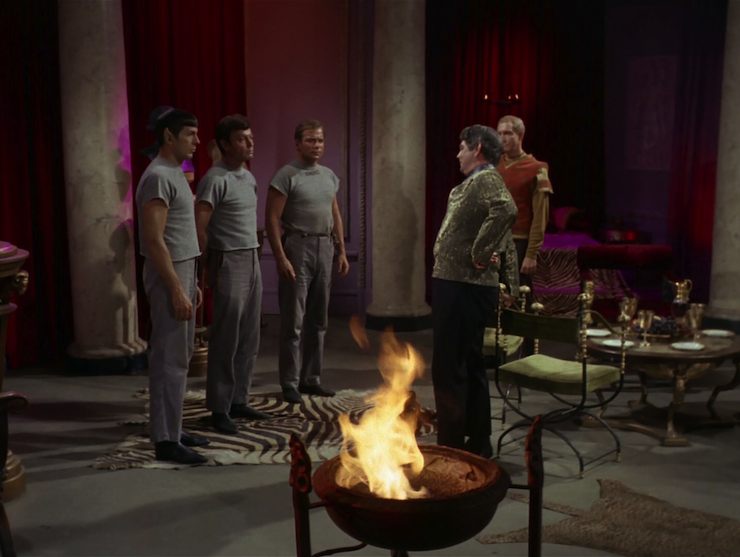
Then the cops show up and arrest them. The cop in charge is particularly thrilled to have recaptured Flavius Maximus. All four of them are hauled off to a prison cell. Kirk asks the cop to tell Merikus that Jim Kirk wants to see him. The cop sneers at him and locks them up.
Flavius explains that slaves used to rebel in the old days, but conditions improved, they got pensions and benefits and such, and discontent abated, but then many of them started to believe in peace and love and such, and they revolted once again.
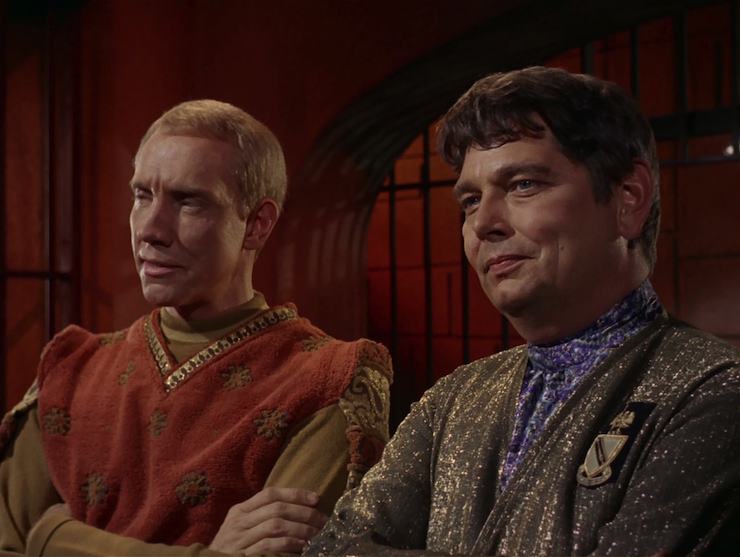
Flavius is taken away by the cops, and the other three are about to be taken away to another cell, but they make an escape attempt. Unfortunately, the cops had backup, which includes Merik as well as the Proconsul, Claudius Marcus. Claudius has all three taken to the palace. Claudius is also aware of who and what the landing party is, so they can speak freely.
Merik explains that the Beagle suffered meteor damage. They beamed down to find an ordered world that would not tolerate outside ideas. Merik made the decision to stay, scuttle the ship, and have the crew live on this world. Those who could adapt still live; those who couldn’t, died in the arena.
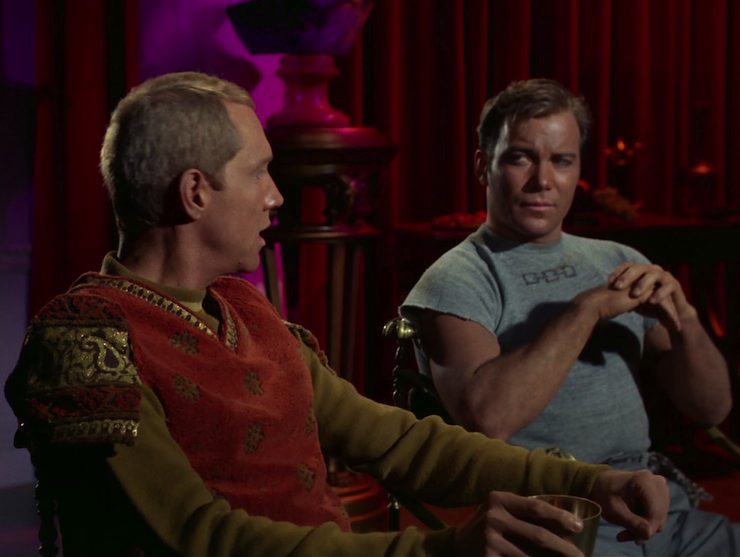
Claudius wants Kirk’s crew to beam down and join their society. Merik knows that they’ll beam down eventually to try to find the landing party after not checking in for a long time. Claudius hands Kirk a communicator, and then several cops put their guns to the landing party’s heads. Kirk tells Scotty, “condition green,” which is code for “we’re in trouble, but you can’t do anything about it.” Scotty is unwilling to completely sit on his hands, and orders Chekov to figure out what it would take to overload the planet’s power grid with the Enterprise.
Kirk is taken to the City Arena, which is a TV studio. Kirk sits in the Proconsul’s box with Claudius and Merik. The gladiatorial fighting is broadcast live, and the audience gets to pick the winner. Rather than an actual studio audience, a machine does cheering and jeering and applauding, and there’s an announcer calling the action.
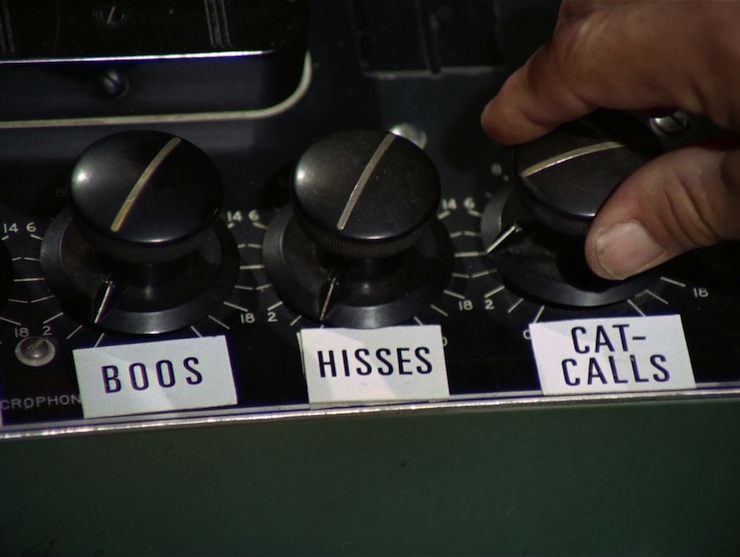
Spock and McCoy are brought out as barbarians to face two gladiators in uniform: Flavius is one of those two. Spock holds his own against his opponent, though he fights defensively. So does McCoy, but with far less skill—but Flavius refuses to fight McCoy with the same aggression, despite being whipped by the overseer.
Claudius thinks that Kirk should be disgusted by this, but Kirk just grins smugly and says that he’s seen stuff around the galaxy that makes this look like a folk dance. He’s also ordered members of his crew to their deaths to save others before. Claudius’s mistake is in thinking that Kirk is the same as Merik, not understanding that there’s a huge difference between the Academy washout who commands a merchant survey vessel and the decorated officer who commands a capital ship.
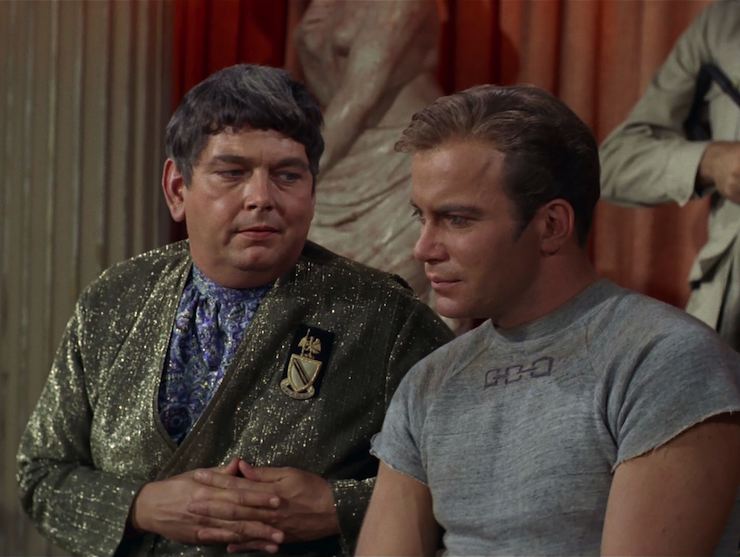
McCoy finally falls to Flavius, and Spock stops assing about and takes down his opponent in half a second, then doing the same to Flavius with a nerve pinch. The “crowd” boos, and the overseer asks for a decision regarding Spock’s foul. Claudius has them sent back to their cage; they’ll fight again, is all.
Claudius sends Kirk to his quarters, where his slave Drusilla is waiting for him, wearing a magnificently skimpy outfit. She has been instructed to be Kirk’s slave for the evening. Kirk is unimpressed, and says he refuses to perform for Claudius’s benefit.
In their cell, Spock tries to figure out a way to break out. McCoy accuses him of frustration, given that it’s the fifteenth time he’s tested the strength of the bars. McCoy tries to thank him for saving his life, and Spock blows it off as a logical exercise in not depriving the Enterprise of its chief medical officer. McCoy accuses Spock of not being afraid to die because he’s more afraid of living and having a real warm feeling burble up through the logic. Only then does Spock admit that he does have one warm feeling: worry about Kirk, and McCoy has that same one.
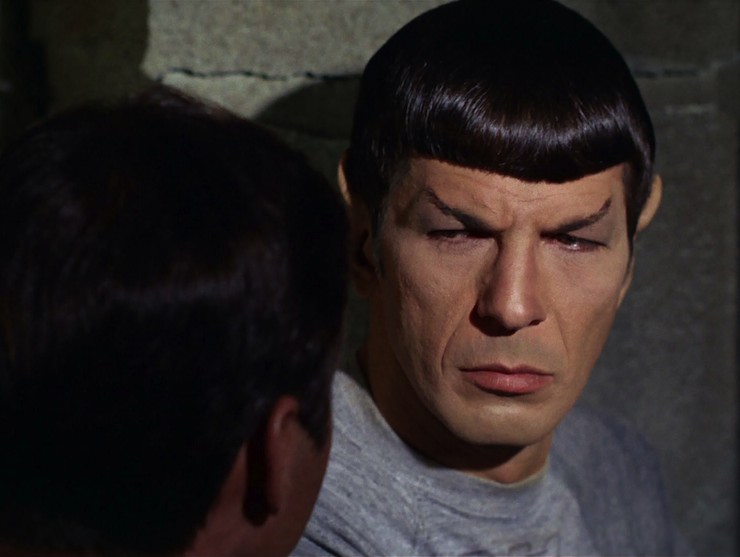
However, they needn’t be worried, as Kirk’s eating and drinking and smooching and canoodling with a hot blonde. He wakes up the next afternoon—wah-HEY!—to find Claudius, Merik, and two cops in the room. Claudius mentions that one of the communicators is missing. Claudius also explains that he sent Drusilla as a sort of parting gift, that as a man, Kirk deserved one last night of rumpy-pumpy. Claudius then kicks Merik out of the room, because a discussion between men is no place for him. (Burn!) Claudius explains that disobedience can’t be tolerated, and so Kirk will be executed in the arena. It’s a prime-time event, and it’ll get great ratings.
But then Flavius shows up and distracts the executioner, and then Scotty orders Chekov to black out the city. That causes enough confusion for Kirk and Flavius to take out the guards, though Flavius is killed. Kirk, armed with a weapon, heads down to the cell to spring Spock and McCoy. The cops attack, but Merik has the missing communicator, and he contacts the Enterprise. Claudius stabs him in the back, but it’s enough to get Kirk, Spock, and McCoy beamed back to the ship.
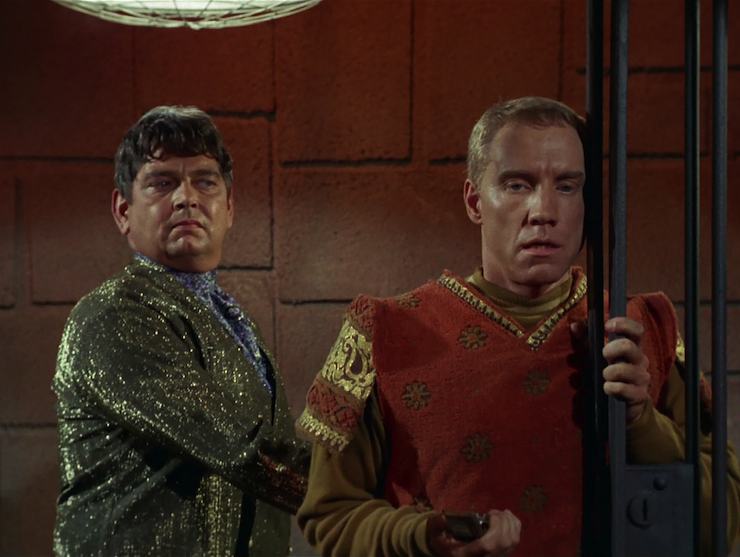
Kirk gives Scotty a commendation for his temporary blackout, which still keeps the Prime Directive obeyed and also saved the lives of the landing party. Spock says he wishes he could have observed this peace-and-love religion some more, as sun-worshippers don’t usually follow that track, but Uhura—who’s been listening to radio broadcasts—explains that it’s not worship of the sun in the sky but of the son of God. (Flavius had mentioned earlier that the religion first formed two thousand years ago, but it was suppressed for a long time.) Kirk realizes that they had Caesar, but they also had Christ, and he wonders how that will develop.
Fascinating. Spock tries very hard not to hurt the gladiator he’s fighting, a consideration that lasts right up until McCoy’s life is in danger. But he’s definitely holding back until then.
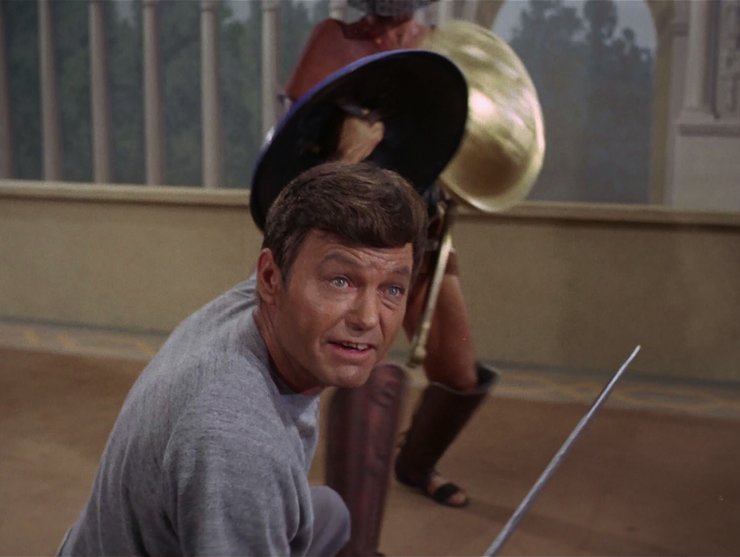
I’m a doctor not an escalator. The gladiator scene is one of McCoy’s most triumphant moments, with Flavius yelling at him to defend himself, and McCoy throwing his arms open and shouting “I am defending myself!” Followed, of course, by his taking the time from getting the shit kicked out of him to yell at Spock for the abject stupidity of asking him if he needs help.
Hailing frequencies open. Uhura’s the one who discovers that the sun worshippers are actually son worshippers, mostly by listening to talk radio, which—if it’s anything like twentieth-century Earth, and we know it is, since Spock made sure to mention it five hundred times in the first fifteen minutes—means she got a pretty skewed view of it…
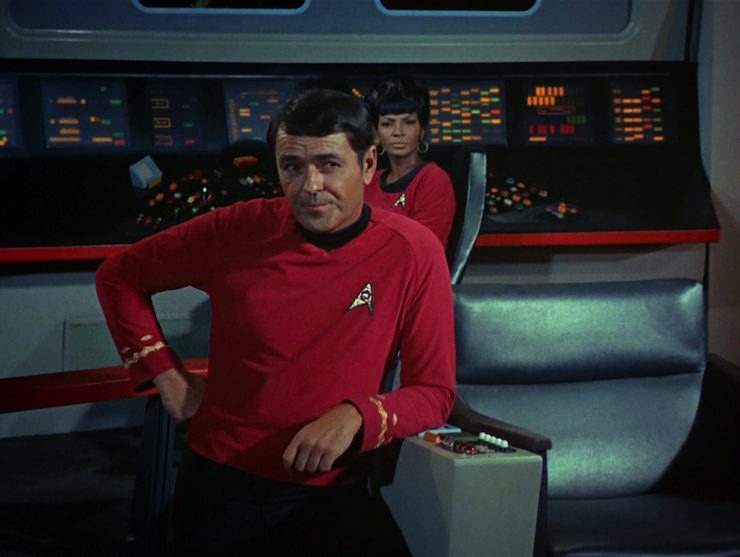
I cannot change the laws of physics! Scotty refuses to take “no” for an order and goes ahead and interferes despite Kirk telling him not to. But he does it subtly enough that everyone gets away unscathed.
It’s a Russian invention. When Kirk orders Chekov to trace the course of the Beagle‘s debris, Chekov announces that he already did so and it’s on the board. The kid obviously is taking the initiative…
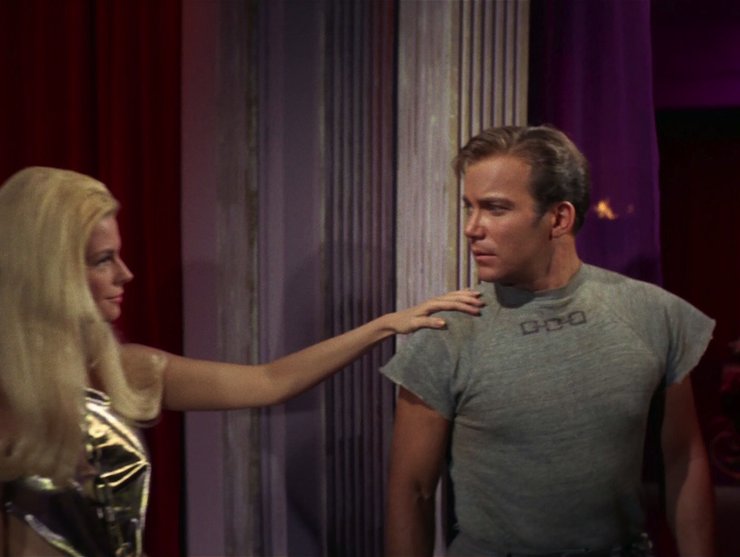
No sex, please, we’re Starfleet. Spock and McCoy languish in a prison cell. Kirk gets a comfy bed with a hot blonde in it. It’s good to be the captain, I guess…
Channel open. “What do you call those?”
“I call them ears.”
“Are you trying to be funny?”
“Never.”
Flavius and Spock discussing otology.
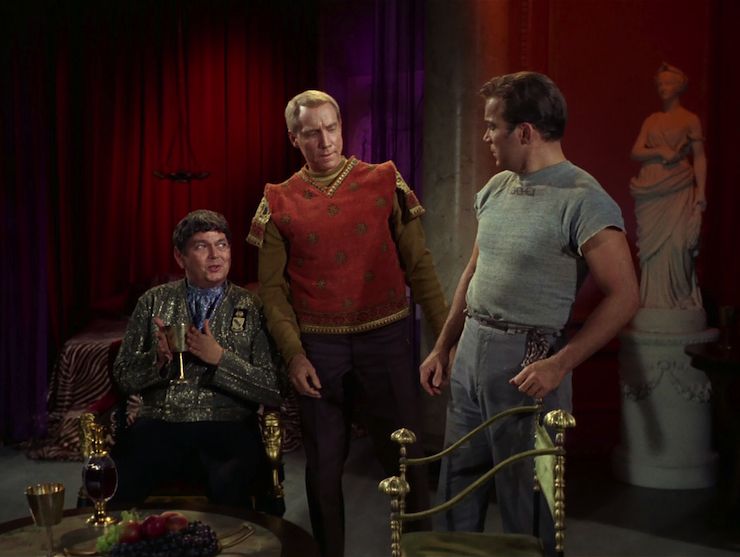
Welcome aboard. William Smithers is appropriately pathetic as Merik, Logan Ramsey is fittingly slimy as Claudius, Ian Wolfe is simply beatific as Septimus, Rhodes Reason is sufficiently grumpy as Flavius, William Bramley and Jack Perkins are incredibly nasty as the cop and the overseer, respectively, and Lois Jewell is suitably sexy as Drusilla. Wolfe will return in “All Our Yesterdays” as Mr. Atoz.
Regular voice actor Bart LaRue plays the announcer of the games. LaRue previously did the voices of Trelane’s dad in “The Squire of Gothos” and the Guardian of Forever in “The City on the Edge of Forever.” He’ll appear again in front of the camera as a newscaster in “Patterns of Force” and lend his voice to both one of the Providers in “The Gamesters of Triskelion” and Yarnek in “The Savage Curtain.”
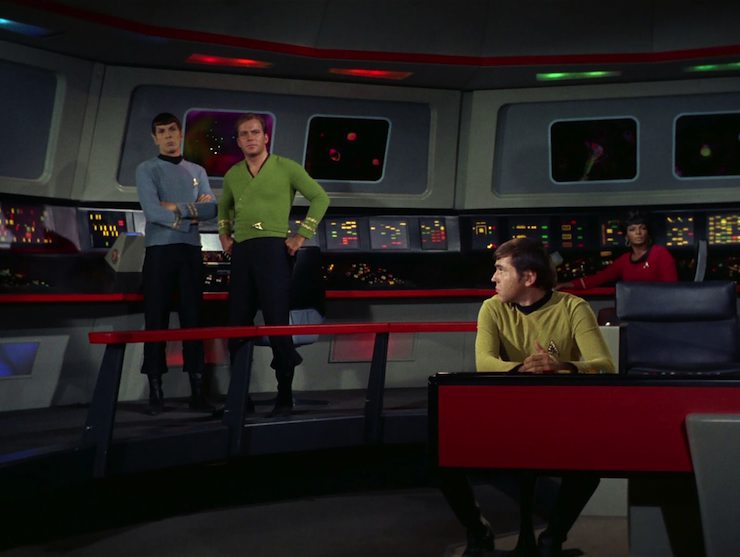
Plus we’ve got recurring regulars Nichelle Nichols, James Doohan, and Walter Koenig.
Trivial matters: This story was based on a treatment by John Kneubuhl, but he received no credit for it.
The title derives from Book IV of Juvenal’s Satires, specifically Satire X: “Wrong Desire is the Source of Suffering.”
Establishing shots of the city used footage of the Great Dome at MIT and Palais de la Légion d’Honneur in Paris.
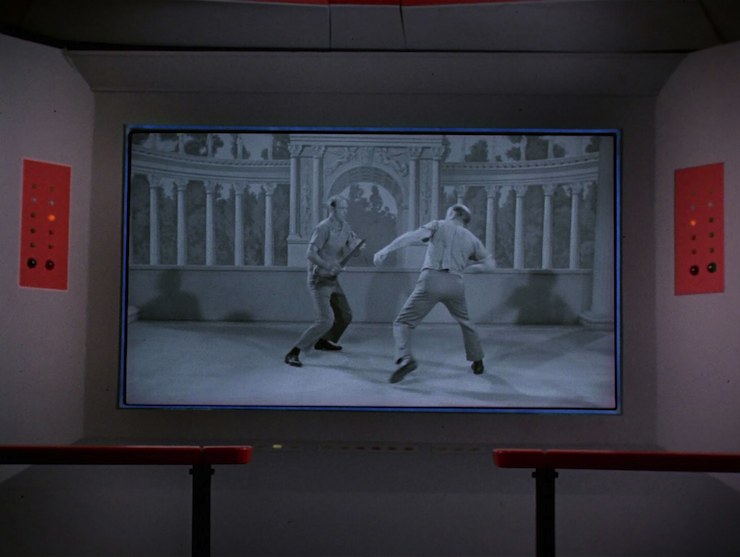
The planet was given the name Magna Romana in the tie-in fiction. The TNG novel The Captains’ Honor by Daniel & David Dvorkin establishes that Magna Romana joined the Federation in the twenty-fourth century, and Picard clashes with a Starfleet captain from that world named Lucius Sejanus of the U.S.S. Centurion. (That name is an amusing in-joke, since Sir Patrick Stewart played Sejanus in I, Claudius in 1976.) The world is also mentioned in The Autobiography of James T. Kirk by David Goodman.
This episode marked the beginning of the transition from Gene L. Coon to John Meredyth Lucas as the producer/show-runner. Lucas visited the location shooting for this episode, and would later report to Herbert F. Solow & Robert H. Justman for Inside Star Trek: The Real Story that he saw a great deal of consternation on the set, as none of the actors seemed to get along with any of the other actors, and none of them got along with Gene Roddenberry. Clashes with Roddenberry are the main reason why Coon left, and indeed Roddenberry was rewriting this very episode (originally a Coon script) during shooting.
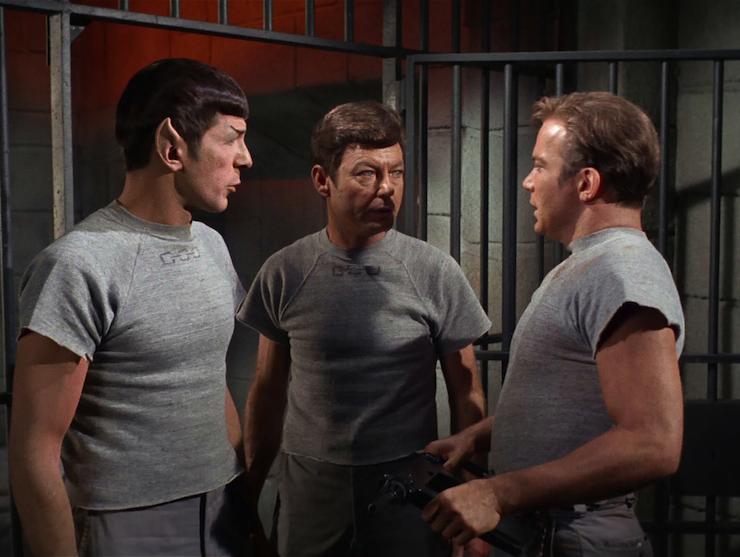
The caves where Septimus and his gang hang out are located just under the Hollywood sign. Those same caves were used for the entrance to the Batcave in Batman, among many other places.
To boldly go. “You may not understand because you’re centuries beyond anything as crude as television.” Parts of this episode are simply brilliant. The satire of television is spot-on and beautifully done. I particularly love the overseer threatening Flavius with having a special done on him if he hurts the ratings. McCoy is at his snotty best in this episode, and the dynamic among William Shatner, William Smithers, and Logan Ramsey is magnificently played: Shatner playing Kirk as calm, cool, and collected, just waiting for the right moment, and refusing to give in to Claudius’s baiting; Smithers showing the struggle Merik has trying to rationalize what he’s done, which was probably much easier to do before Kirk showed up, and realizing how badly he’s screwed up; and Ramsey’s Claudius is superbly slimy, but also makes the fatal flaw of many despots in assuming he’s the smartest person in the room even though he totally isn’t, particularly since he makes judgments on all Federation citizens solely on the basis of one especially mediocre example of the breed.
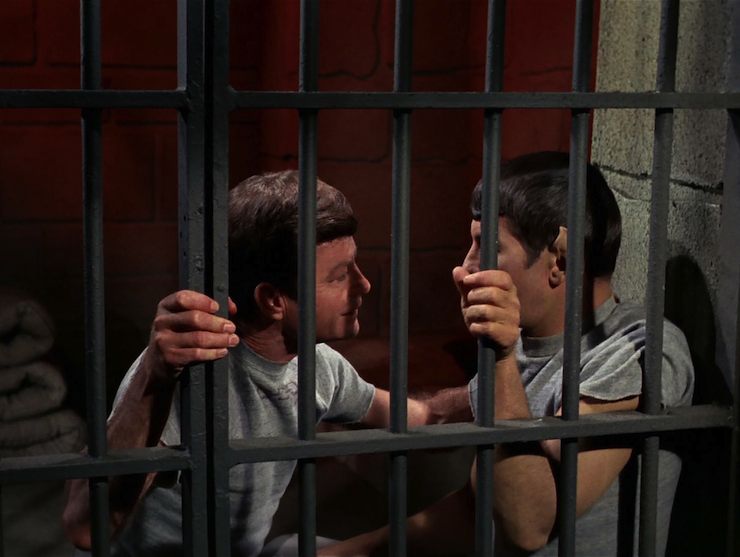
I’m of two minds about the Spock-McCoy banter. Flavius’s query as to whether or not they’re enemies is a legitimate one, as their mutual abuse tends toward the nasty. McCoy’s needling about Spock being scared of a “legitimate” human feeling is borderline racist, but Spock’s regular critiques regarding McCoy’s skill and professionalism aren’t exactly sterling examples of proper behavior toward a fellow officer, and his own colloquies on logic would seem to indicate that insulting the guy responsible for your health is the height of illogic. On the other hand, the moment when Spock all but admits that he’s worried about Kirk is a beautiful moment, and McCoy’s ranting in the arena is classic.
(I’m of one mind about Kirk going ahead and sleeping with Drusilla, and it’s disgust. There’s no excuse for his doing so, no reason for him to capitulate to Claudius’s awful views on what constitutes manliness, and no justification for having sex with a woman incapable of consenting to it of her own free will.)
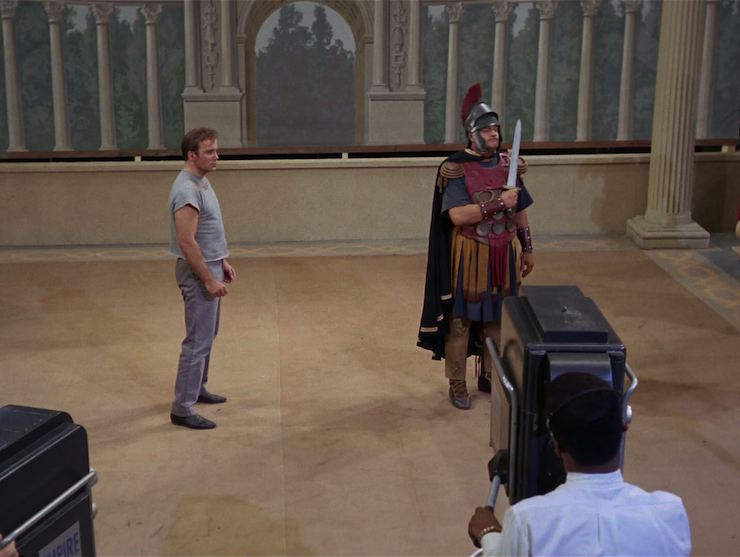
The parallel to Rome might have been more effective if the script didn’t hammer it home so relentlessly. Spock spends the first third of the episode going on and on and on about how much like Earth the planet is, down to them actually speaking English (a rare case where Star Trek even acknowledges the possibility of a language barrier, but it’s kind of necessary for the sun/son confusion to work), not to mention Kirk’s citing of “Hodgkin’s Law of Parallel Planetary Development,” a nonsense law created to justify copious use of Southern California locations, sets on existing backlots, and costumes lying around Desilu. They’ve dipped in this well before in “Miri,” and here at least it’s somewhat relevant to the plot, though it adds to the episode’s unfortunate sledghammeriness. (This will be handled better in “Patterns of Force” and “A Piece of the Action,” where the parallels are externally imposed, and worse in “The Omega Glory,” about which the less said the better.)
I also wonder why no mention was made of what to do with the members of Merik’s crew who were still alive and living on the world. Sure, they’d assimilated at that point, but probably because they saw that as a preferable alternative to the arena. What if they wanted to go home? It probably wouldn’t have been practical to do anything about them, but some discussion of them beyond their existence would not have been untoward.
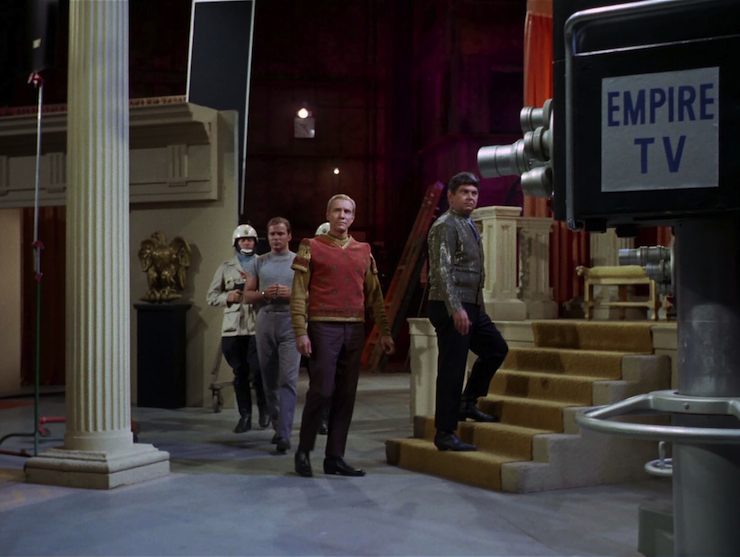
And while the Enterprise crew seem to view the coming of Christianity as a force for good—and the son/sun worshippers’ beliefs in peace and “brotherhood” (I guess women need not apply?) is certainly, as presented, very noble—all I can think while watching the ending is, “Great, the Inquisition should happen right in time to be livestreamed…”
Warp factor rating: 5
Next week: “Journey to Babel”
Keith R.A. DeCandido is the author of the new Marvel’s Tales of Asgard trilogy. Book 1, Thor: Dueling with Giants, is available now as an eBook, and you can preorder the print edition, which is due in March. You can also preorder the print edition of Book 2, Sif: Even Dragons Have Their Endings, and Keith is hard at work on Book 3, The Warriors Three: Godhood’s End.










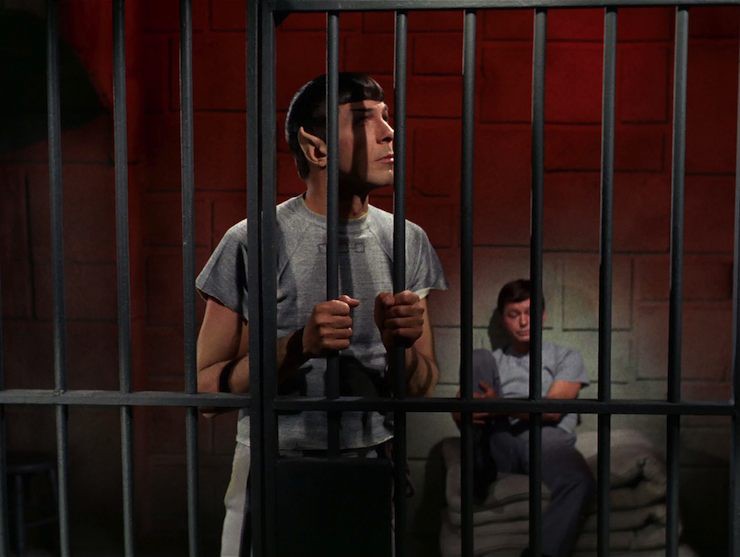
One thing I never understood about this episode is why did NBC delay its airing all the way to the end of the season. It makes no sense.
Watching it as a kid, the TV satire flew way over my head. It took me years and this rewatch for me to finally grasp what the episode was going for. While flawed, I definitely enjoyed this one. Given this was being rewritten while filming, I’m surprised it all came together to form a pretty watchable entry.
Regarding Coon’s exit, I thought it was related to his being overworked and on the edge of a nervous breakdown (which also affected both Roddenberry and Justman the previous season). There was also the matter of the cancer (he might have learned about it back then and decided to retire), which would ultimately claim his life by 1973.
John Meredyth Lucas is an interesting case in that he’s the transitional showrunner nobody remembers, much like the late Michael Wagner on TNG. Everybody remembers Roddenberry and Coon with fond memories, and Freiberger with less than fond memories.
I pretty much agree with Keith here. The best parts are the satire of television and the Spock-McCoy scene in the cell (one of their very best exchanges). But the premise is ridiculous. I know Roddenberry only adopted the parallel-Earths conceit because it was the only way to make the show affordable, since it’s cheaper to reuse existing costumes, props, etc. than to design and build completely alien societies all the time. But he really embraced it and doubled down on it both here and in “The Omega Glory,” taking it to a ridiculous extreme — even to the point of stressing the use of colloquial English, even though plenty of other aliens have spoken English without explanation.
In my “headcanon,” as they say, this is a Preserver-seeded world, although the use of 20th-century American tech and language is harder to explain, unless there was some later intervention. At least they could’ve claimed that it was the result of the Beagle crew’s interference, as in “Patterns of Force” and “A Piece of the Action.” After all, the Romans often adopted elements from other cultures and folded them into their own, from Greek mythology and knowledge to Christianity. (Although The Captains’ Honor fully embraced the parallel-Earth conceit and took it even further than the episode did, going beyond having Magna Roma be a world with similar geophysical attributes to Earth and having it be a “Miri”-like exact Earth duplicate whose history matched Earth’s exactly up until Roman times. The in-joke with Patrick Stewart’s Sejanus went beyond the namesake captain; in the book, the two worlds’ history diverged with the coup attempt by the original Sejanus, the very character Stewart played — a coup which failed on Earth but succeeded on Magna Roma.)
I also agree that the handling of Drusilla is unconscionable. This is the one time that Kirk really lives down to the womanizer stereotype that pop culture has attached to him.
I also want to thank my dear friends Meredith Peruzzi and Dale Mazur, for commentary during the watching of this episode that were incorporated into this rewatch. :)
—Keith R.A. DeCandido
Whatever flaws it may have, it’s totally worth watching for the satire of network television. Like you pointed out, the “doing a special on you” line is brilliant. And I wanted to see what other shows the Empire had to offer. Live from that ancient Roman city of Indianapolis, “The Chariot Race 500!” The children’s hour with “Mr. Nero’s Neighborhood!” And that hit reality series, “Feeding the Lions!” Haha, I wouldn’t be surprised if Paddy Chayefsky took some inspiration from this episode when he wrote Network.
Great rewatch. It sums up the good and the bad parts of this episode really well.
Some additional things I like about the episode:
– It touches upon the problem of having a rule of non-interference which can’t actually be enforced. How can the Federation prevent the Harry Mudds of the galaxy from disturbing less technologically advanced cultures? They can’t – they can only make rules, set penalties and hope that their starships get everywhere first.
– It’s a good alternate history about a world where Rome never fell, with pensions for slaves and gladiatorial combat on TV. It’s also plausible that they are always looking for “barbarians” for their fights because if they have conquered the whole planet, there probably aren’t enough of those left on their own world. It would have made a good alternate universe story. (If the language had been Italian instead of English.)
– Merik is really well cast. I can imagine him playing Caesar in some historical drama. That makes it even more effective when he turns out to have a totally different personality.
@2/Christopher: I wouldn’t say that Kirk acts like a womanizer. He doesn’t seduce Drusilla, he accepts an offer. Which isn’t any better, mind you – I agree that it’s disgusting – but it’s not the same thing. It’s the same kind of playing along he does in the previous scenes, only in this situation playing along is the wrong thing to do.
@5/Jana: What I meant to get across is that generally, Kirk’s relationships with women fell into a few categories: not allowing himself to get involved because his career came first (e.g. Rand or Eve); merely manipulating them or allowing them to seduce him for the sake of a mission or other goal (e.g. Lenore, Andrea, Sylvia, Kelinda, Deela); being manipulated or in an altered mental state himself (e.g. Rand or Helen Noel); reuniting with an old flame he formerly had something serious with (e.g. Ruth, Areel, Janet Wallace, Janice Lester, or Carol Marcus); falling sincerely in love (Edith, Miramanee, Rayna); or getting briefly close but having to move on quickly (e.g. Shahna or Odona). The only instances where it was reasonably clear that he actually had sex with them during the episode were Drusilla, Miramanee (because she got pregnant, duh) and Deela (the infamous “putting his boots back on” scene). But the other two fall into one of the above categories. This is the one time I can think of where Kirk got physical with a woman where it was neither part of a mission, the consequence of something done to him, or a genuine relationship. It’s the only time where it was purely physical and gratuitous and served no story or character purpose other than to get the hero laid. The shallowness of that is what I’m referring to when I bring up Kirk’s womanizer reputation, because that reputation unfairly paints his relationships with women as consistently shallow.
Sure, as you said, you could argue that it was about Kirk playing along toward a goal, as with Sylvia or Deela; but in that case, Drusilla herself is not the one he’s playing. She’s just a pawn in the game rather than one of the players. She’s less a character than a prop. And it feels like the only reason she was there at all was to let Roddenberry indulge a fantasy (although I don’t know how much of the episode is his and how much is Coon’s).
@6/Christopher: If you put it like this, I agree. (And I was wondering if the scene had been added by Roddenberry too.)
@3/Keith, thanks for letting me peek at your process!
The alternate history here is so lazily done I can’t even regard it as such. It was a completely unnecessary reason for the civilization to be Earth-like. Like Keith and Christopher said, it was about keeping costs down, but that doesn’t mean they had to go with the “Rome never fell” bullshit. It’s window dressing for a civilization that could have operated that way all on its own. I’d be curious what the writing sequence was like – when did Rome get added to the mix?
And who says “son worshippers,” anyway? Cheap gag, even if it did give Uhura the chance to be the one with a clue, for once.
Finally, we have now entered the portion of the rewatch where I get all twitchy every time the producer’s name shows up in the credits…
@8/MeredithP: None of the “Christians” in the episode called themselves “son worshippers.” That was McCoy’s term, echoed by Kirk and Spock, because they thought it was “sun.” The believers themselves never used the word “worship” but instead used phrases like “Children of the Son,” “Brother of the Son,” “the word of the Son,” “Blessed be the Son,” etc. It’s actually kind of an impressive use of language, giving the believers lines that make sense in the context of “the Son” being Christ (or an alien analog) and allowing the Starfleet characters to project their own assumptions of “sun worship” onto it. Both groups are consistent in their own distinct usages, and yet our guys don’t notice the discrepancy because they’re stuck within their own preconceptions. However silly the underlying concept, that’s deftly written.
One detail that I found interesting was the reason Merik washed out of the Academy: he failed a psychological test. In the 24th century, we know from “Coming of Age” that the psychological test (“The Psych Test” as people call it) now happens before a cadet is even admitted to the Academy. I’ve always wondered if the Academy put that policy in place some time after Merik failed in order to pre-screen bad candidates and not waste time and resources on a cadet who is doomed to be a lost cause.
@5/Jana: Excellent point about random Harry Mudds contaminating cultures before Starfleet can do anything about it. IIRC there was an unmade original series script (intended to star Milton Berle!) which would’ve addressed this very issue.
Watching Star Trek for the first time as a kid, I remember being quite astonished the first time we encounter Mr Mudd, because it hadn’t even occurred to me that ‘private’ interstellar travel could be a thing!
@10/richf: I doubt there’s only one psychological test in the course of Academy training. There are probably several at different stages — one to test whether you’re even a fit candidate to begin with, one to assess the right career path for you, one to see if you’re ready to graduate or go to command school, whatever. Heck, the Kobayashi Maru was essentially a psych test — “a test of character,” as they put it, to see how a command candidate reacted to a no-win scenario. Although that probably isn’t the one Merik failed, because the whole point of it is to assess one’s response to failure.
On the Inquisition: So long as this world doesn’t produce a Constantine, a militant emperor who co-opts a pacifistic religion and messes with it no end–including being willing to execute bishops who didn’t agree with his definition of orthodoxy–I think they’re relatively safe.
They’re also unlikely to have a Spain finally freed from centuries of foreign oppression going after anyone who even slightly varies from what a good Spaniard is supposed to be with full on torture and grisly death.
@13/Ellynne: It didn’t take long for our world to produce a Constantine, and they’re no different from us, so I wouldn’t say they’re safe.
But I agree about the Inquisition. It seems that their whole world is already united, so with their equivalent of Christianity spreading worldwide, probably none of the prerequisites for the Inquisition would emerge. (No Islam, no conquest of Spain, no Reconquista.)
This is the only episode of The Original Series in which I’ve ever had a queer-theory interpretation of the character dynamics–I tend to read Claudius and Merik as lovers (you know, in that Roman Empire sort of way, since 892-IV wouldn’t have a Christianity-tinged view of sexual orientation), and part of Claudius’s mistaken take on Kirk is thinking that he’d take Merik’s place in this sense as well.
When Claudius showed up, all I could say was, “It’s the cop from Head!”
But I’m sure that’s just me.
@8/MeredithP One reason for using the Romans instead of just a generic civilization is that some historians believed that one of the major cause of the fall of the Roman civilization was Christianity. It’s a view that has mostly fallen out of favor but I believe it was more common back in the sixties. This episode then runs with that and assumes that Rome never fell because the Children of the Son were suppressed. Spock goes along with this theory when he says “It will replace their imperial Rome, but it will happen in their twentieth century.”
@17/Robert: Of course, the main reason for using Rome was because it let them recycle Roman costumes and set pieces from the studio warehouse, just as “A Piece of the Action” was written as an excuse to use leftover Untouchables stuff and “The Paradise Syndrome” was an excuse to haul out some Indian costumes and so on. Like I said, the parallel-Earth idea was written into the original Star Trek pitch document as a way to sell network execs on the idea that the show could be affordable to make because it could reuse existing materials like that. So episodes like this started with “We need an excuse to do a Roman planet/gangster planet/Nazi planet/etc.” and then the backstory was invented to justify it. (Honestly, sometimes I wish Roddenberry had come up with Sliders instead of Star Trek. An alternate-worlds show would’ve fit the conceit better than a space-exploration show.) In this case, they just combined “parallel Rome” with “parallel 20th-century America” and went from there.
@9/Christopher – Thanks for the correction on how the words were used in the episode. I didn’t have subtitles on when I watched it, so I didn’t get 100% of it.
@17/Robert – That interpretation was put forward mostly by Edward Gibbon, and has been under criticism pretty much since he wrote it in the 1780s. I would not say it was any more accepted among historians in the 1960s than it is now, and even books written for the general public (eg, Haywood, 1958; Finley, 1968) put forward criticisms. Womersley is one of the main recent analysts of Gibbon, and there have definitely been a lot more since about the 1980s, but I hesitate to say that Gibbon was thought to be “right” in the 1960s, even if Roddenberry did latch onto that one. :-)
@18/Christopher – And therein lies my issue…we could’ve done just fine with one or the other, but the trappings of one (Rome) on the more solid base of the other (20th century America) is what makes my stomach turn here. The “City Arena” could’ve been an actual arena, not a TV studio…or we could have done without the silly getups and names, and just let the actors wear contemporary street clothes.
@19/MeredithP: “The “City Arena” could’ve been an actual arena…”
Not on ST’s budget. Having it be a fake arena on a TV soundstage was a clever way to take their own production limitations and make them part of the story. There was a bit of self-parody involved, I think, right down to using their frequent voiceover man Bart LaRue as an on-camera announcer.
The Roman part is basically classical Hollywood’s view of the Roman empire always filtered through a sugary veil of christianity being oppressed but winning in the end. Especially Quo vadis? seems to be the foil for this part of the story, we have christians in the underground, a strong christian man as hero, the peril of the arena, an old sage, a degenerate Roman leader and a man who waivers between Roman and christian values (Merick here, Robert Taylor in the 1951 film). The only thing missing is surprisingly a love story.
Merging this with a media satire a la Network is one of the most daring genre mixes I can imagine, it’s one critical, modern, subversive genre intervowen with a very conservative one. It doesn’t work, obviously, but it’s fascinating.
Come to think of it, the idea of Christianity “replacing” Imperial Rome is a bit warped, since Rome adopted Christianity and continued for some time beyond that — not to mention that Western history tends to forget that only the Western half of the Roman Empire fell in the 5th century, while the Eastern Roman (aka Byzantine) Empire endured for another millennium.
@19/MeredithP: Funny, that’s one of the things I like about the episode – they don’t merely encounter a parallel Rome but a parallel future Rome, so to speak, and I think it was well made.
And isn’t media sensationalism plus gladiatorial-style combat a classical mixture (e.g. “The Hunger Games”)? BTW, does anyone know who did this first? It’s probably older than this episode. Right?
Parallel Earth geography and parallel cultural development are silly, but they never bothered me much – after all, this is a universe where all the aliens look like humans. Even on our single planet, evolution hasn’t produced humans (or any other kind of animals) more than once, and we’re all related and constructed from the same kind of cells. That takes some massive suspension of disbelief. After that, accepting parallel geography or parallel cultures is easy.
@@@@@14/JanaJansen, Constantine was a gifted, charismatic leader with a good supply of political savvy but also capable of thinking outside the box. He lived during difficult political and social times. Had the times been different, he may never have openly favored Christianity as he did. Had he been different, he might not have been able to do so successfully. Under different circumstances, the Christian leaders might have been less likely to fall into line and do what the emperor wanted. They might have stood up to the idea of death or exile for those Constantine considered unorthodox.
Of course, the thing with alternate universe pivot points is that you can say what wouldn’t have happened, but that doesn’t mean you can say what would have happened instead. Would Christianity remain highly pacifistic? Would it break into multiple sects with varying doctrines? Would it adopt elements of Roman political structure and thought even without Constantine?
The only certainty is that it would be different, I suppose.
@20/Christopher – Right, of course. That’s why we have what we have instead of either of the two scenarios I’d prefer, as I described. :)
@23 – This is the earliest example of TV gladiatorial games I’ve seen, but it could have been done before. It was done again in the 1987 film Running Man, starring Arnold Schwarzenegger and Richard Dawson, based on a novel by Richard Bachman, AKA Stephen King. And there was another one around that time with giant robots called Robot Jox. Both were cheese-tastic!
@26/StraightShooter: Robot Jox was actually scripted by Joe Haldeman, although he clashed with director Stuart Gordon over how serious and intelligent the film should be.
@18, ChristopherLBennett – I know they did it mostly for the cost savings but I’ve always like how the Children of the Son part really does tie it specifically into the Romans. It was a nice touch in my opinion.
@29, MeredithP – It may have fallen out of favor with the historians by the 1960s but this show wasn’t written for historians, it was written for the general public, and back then more people took Western Civilization courses and would have had at least a passing familiarity with the idea of Christianity causing Rome’s collapse, even if only to hear that it was wrong. The writer obviously had heard it and felt his audience would also have heard it.
@27 – “Robot Jox was actually scripted by Joe Haldeman.” Okay, I wasn’t suggesting Stephen King wrote it too, if that’s what you were thinking. Good to know anyway. Thanks.
@29/StraightShooter: No, I just thought it was worth noting that Robot Jox was written by an accomplished science fiction author, because it’s not the sort of thing you’d expect from a movie like that.
@24/Ellynne: Yes, the circumstances would be different, and there are many possible outcomes. All of your alternatives sound good. It really would be interesting to watch it happen :-)
@26/StraightShooter: Thank you! I used that as the starting point for a quick web search and found that apparently there were precursors, but they were more about hunting humans than about gladiatorial games. That exact mixture seems to be rarer and less obvious than I thought.
Now I like the episode even more.
I always thought of this as Trek’s “Christmas” episode…
My personal opinion is that in addition to the Preservers moving cultures off Earth or Vulcan other far less noble Aliens wanted to experiment with various Earth time periods and has easy access to time travel and high tech.
It would explain the centuries gap on Miri, B&C and Omega Glory to the ST timeline of ST. Miri’s disaster occurred in the 1700’s for instance.
They could have been advanced enough to not outright steal people but merely duplicate them with false memories for the test. Why, who knows. FUN & GAMES or a A FEASIBILITY STUDY both ala Outer Limits or that most base of HUMAN motivation for evil: Because we could.
@33/Steve Cabral: No, in “Miri” it was clearly stated that the disaster happened 300 years before the episode, which by modern timeline assumptions corresponds perfectly to the 1960s setting of the planet.
And I’ll discuss “The Omega Glory” when we get there, although you see what I think about it if you read my novel Department of Temporal Investigations: Forgotten History.
Interesting, Starfleet Academy was over five years, I had the idea that by TNG times it was a four year course.
Oh, by the way, another note about the episode title: “Bread and Circuses” is a translation of the Latin panem et circenses, which is the source of the country name Panem in The Hunger Games, and is another reference to Juvenal’s Satire X. The phrase describes the cynical notion that if you appease the public with food and entertainment, they won’t care about anything else like freedom or justice. This idea shows up in a lot of dystopian SF, particularly involving regimes that use televised blood sports to condition the people to devalue human life, e.g. Rollerball, Death Race 2000, The Running Man, or Doctor Who‘s “Vengeance on Varos.”
Oh, I certainly knew the phrase “bread and circuses” and its implications; but I had never actually read it in Latin, so I had not noticed the connection with Panem. Odd, since I’ve usually hear the phrase in Spanish, “pan y circo”.
lordmagnusen: Yeah, TNG and DS9 (mostly in “The First Duty” and in Nog’s Academy odyssey) established that the Academy was a four-year program, but given that there’s a century of time between TOS and TNG, there’s time for the program to be changed and/or streamlined.
—Keith R.A. DeCandido
I wasn’t implying that couldn’t happen, just commenting that I didn’t remember they had established it as a longer course back in TOS.
I figure maybe the regular program is four years and then there’s extra time for command school, sort of like graduate school.
I made a similar comment for “Metamorphosis” (and I just went back and made one for “This Side of Paradise”, too), but I thought I would provide a link to Ralph Senensky’s blog entry about the filming of “Bread and Circuses” for those who are interested.
http://senensky.com/bread-and-circuses/
Robert B: thanks for those. :)
—Keith R.A. DeCandido
Yeah, thanks, I devoured Bob’s whole series of entries when you first posted it.
At the end of Blish’s adaptation (my original source of Star Trek stories, having had no TV in the house as,a boy), once they realize it’s “the Son,” not “the Sun,” the author adds “Everything was going to be all right.” Even at twelve, I seem to remember feeling that was a bit off.
Today, when I can introduce you to followers of the Roman deities (and as a Pagan myself), the whole “oh, everything will be cool now because Jesus” grates on me very hard. This irritates me for the same reason Kirk’s Frazer-esque assumption of monotheism’s superiority in WMfA? does; it’s utterly unsupportable and very culturally based (and biased). I realize “writing for 1960s middle America,” but is it necessary to push quite that hard? Grrr…
I understand how it might grate on you, but that is not “pushing hard”, that’s the way it was in the 1960s in America (and many other places in the world).
While this episode certainly has its flaws (a rating of 5 might be a bit low, but not much), it’s also very risky in certain spots, particularly for its time. For example, it presents the idea of televised executions (not just fights to the death), and Kirk’s scheduled execution is presented as common to the point of being boring (though that aspect might have been an attempt to slip it past the censors). It also has Kirk intentionally using a soldier as a human shield against a machine gun. None of that might be as blatant as an interracial kiss, but it was hardly the norm for 1960s family fare.
@46/Scott: No, it seems pretty typical of the level of violence in other ’60s shows. Star Trek wasn’t really “family fare” — it was consciously created to be the first non-anthology science fiction TV series that was an adult drama rather than a kids’ show. So it would’ve handled violence on the same level as something like Gunsmoke or Mission: Impossible. Heck, even a family show like The Time Tunnel had executions, murders, wars, etc. as routine plot devices. Network censors didn’t object to the idea of such things, as long as they weren’t depicted graphically. Plenty of people could be executed or murdered on camera as long as it was bloodless or nearly so, and as long as the actors’ death throes weren’t too gruesome.
@47/Christopher, You are correct that TV in the 1960s was hardly timid in terms of violence, but I think you misunderstood my statement about the execution. I’m not saying it was unusual for executions to happen in the course of a story (particularly by the villains). I’m saying what was unusual was that it was portrayed in story as a form of entertainment for the people of that planet — the idea that a television network would broadcast a live execution for entertainment could not have been run-of-the-mill in the 1960s.
Gene Roddenberry is on record as saying that the fist fight was added to WNMHGB in order to sell the series, so I’m not saying violence on TV or even in Star Trek was restrained. But I don’t recall seeing any TV show in the 1960s in which a hero used a villain as a human shield (and the villain died because of it).
@48/scott: I don’t think there was anything unusual about showing tyrants or totalitarian regimes broadcasting executions or blood sports for entertainment. I mean, that’s basically what Spartacus was about, and it came out in 1960. Remember, the culture here was based on Ancient Rome, just with updated technology. One of the standard tropes of stories about Ancient Rome was their use of blood sports as entertainment, whether gladiator games or feeding Christians to the lions (which was a myth, but a pervasive one in the media). There were a ton of ’60s sword-and-sandal movies about gladiators forced to fight to the death in the arena with crowds cheering on the spectacle. And I’m sure there were plenty of spy shows and adventure shows that painted dictatorships as evil by having them broadcast executions on TV. A televised execution in a totalitarian regime was a key plot point in the 1961 Twilight Zone episode “The Obsolete Man.” The 1970 Mission: Impossible episode “The Hostage” involved them too.
And Mission: Impossible often had the heroes deliberately arranging for villains to die. For censorship reasons, they were nominally forbidden to assassinate bad guys outright (though this was only mentioned in the pilot), but they often arranged to trick one villain into murdering another, or to get an official of an enemy government sentenced to death on trumped-up charges. I was often struck by the show’s hypocrisy in pretending there was a moral difference between killing someone directly and manipulating someone else into killing them. That doesn’t seem all that different from using someone as a human shield.
Heck, that sort of thing was around well before the ’60s. There’s an early issue of Batman from 1939 or 1940, when he was still in his embryonic stage as a character and was much more violent than he ended up being, where he knocked out a guard and dressed him in the Batman costume, so that the other guards would shoot him dead and think they’d eliminated the intruder. He literally set someone up to be murdered purely as a distraction. Of course, it was because of such violent acts that the comic came under criticism and Batman was reworked into a more nonlethal crimefighter by 1941. But that’s because the comics were sold to kids.
If anything, come to think of it, my recollection would suggest that ’60s TV was more violent than later TV. It couldn’t be graphic in its depiction of violent death or torture, but there were plenty of depictions, what with all the Westerns and gangster shows and spy shows and the like. Eventually all the violence sparked protests, and it led to networks trying to make their shows less violent in the 1970s. Spy shows and Westerns faded, and we had more shows about compassionate heroes who tried to solve problems without violence. And that trend lasted through the mid-’80s, when TV shows started to get more violent again, a trend that’s continued to the present. So the time when you wouldn’t have expected to see a TV hero use a human shield would’ve been the ’70s, not the ’60s.
If Rome never fell, regardless of parallel development, the native citizens would be speaking Latin; not colloquial 20th century English.
@50/Dan Fraganato: Well, the Romans themselves would be speaking whatever Latin had evolved into after 2000 years, but their subjects would probably be bilingual, speaking both their native tongues and the official language. In antiquity, the official language of the Empire was Latin in the Western half and Greek in the Eastern half — although in modern times with telecommunication, it would be easier to maintain one global linguistic standard. But subject peoples still spoke their own languages among themselves and used Latin/Greek for official business or communication with people from other parts of the Empire. (For instance, Jesus spoke Aramaic and Greek, and the New Testament was originally written in Greek. Which means, come to think of it, that the “Latin lesson” scene in Monty Python’s Life of Brian should’ve really been a Greek lesson. What’s Greek for “Romans go home?”)
Anyway, in re-reading the earlier comments here, I just realized that the reason the episode had to stress that the natives were speaking English was because it was the only way the “Sun/Son” misunderstanding would work.
Logan Ramsey turns up in MASH playing an equally slimy corrupt officer (in the “incubator” episode), and also turns up in Bill Murray’s “Scrooged” (in a scene with Michael Pollard – who Trek fans will recognize as Jahn from “Miri” (“bonk, bonk on the head”)).
Quoth Christopher: “Anyway, in re-reading the earlier comments here, I just realized that the reason the episode had to stress that the natives were speaking English was because it was the only way the “Sun/Son” misunderstanding would work.”
Re-reading the comments isn’t necessary, as I mentioned that right there in the review of the episode. :)
—Keith R.A. DeCandido
Indeed, I haven’t seen a worse reason for a shaggy dog SF English pun since Damon Knight’s To Serve Man. Which even Rod Serling coudn’t adapt believably.
When the Enterprise took out all the civilization’s power, I was reminded quite a lot of that famous titular scene from The Day The Earth Stood Still. We’re reminded that what a REALLY powerful civilization can do, is knock out your pins with a deft touch. They don’t have to phaser all your cities, for you to get that you are outclassed.
I have seen this show many times since I saw it on TV when it first aired (I’m that old), but this time was the first that (for some reason) I noticed the weapons. Why are all the Roman cops running around with M3 “grease guns”? That’s a really cheap and (dare I say) low-class weapon. Were they saving all the Thompsons for A Piece of the Action? And why do the escaped Sparticus-slaves have scoped bolt-action rifles? I would have given THEM the grease guns. That’s a resistance weapon.
And if the slaves DO have expensive hunting rifles, how is it that with experience there, they allow themselves to get bushwacked by city cops with grease guns?? Such woodcraft.
There’s something else. The supersonic ka-POW of the scoped rifles is about as realistic a sound as I’ve ever heard on TV, for this type of weapon. As a hunter, it made my skin crawl. That’s shots coming toward you.
Did somebody give the The Foley artists the day off, and just let the sound crew take a few shots with a Remington BDL, out there on the county set? Because that’s what it sounds like. With all the other flubs in realism in this episode (look at those jail cells) the sound of the rifle fire could have been any recorded fire they had on hand. But as it is, it’s the single most realistic bit in the whole episode. What gives? I have the feeling they did something with live ammo out on the set that your set insurance would never let you get away with today.
Oh, and by the way, don’t give hound-dog Kirk such a #MeToo hard time for Druscilla. She gives every evidence of enjoying her lot. “COMMAND ME!” she purrs. She does just about everything but give Kirk a safe word. Okay, she’s a slave. But she has Medicare. She might even have something better than the GOP proposes for U.S. citizens in 2019.
@54/ironsteve: There’s also the implication that Drusilla might be in trouble if Kirk doesn’t like her services: “I was concerned. I am ordered to please you” (although that was about the food). Still, it’s an awkward scene, and why doesn’t he lecture her on freedom as he usually does? Does he still think that Claudius is watching them?
The planets in this galaxy seem to exhibit quite a tendency for parallel developments toward Roman empire. This episode deals with a humanoid Roman empire with 20th century technology. But we have also seen a Vulcanoid version of the Empire with space-faring technology!
@54/ironsteve: “Oh, and by the way, don’t give hound-dog Kirk such a #MeToo hard time for Druscilla. She gives every evidence of enjoying her lot.”
She was a slave. She knew she’d get punished if she didn’t give her masters a good time, or showed any sign of defiance toward them. She would’ve learned how to act like she enjoyed it. That doesn’t equal consent. Saying yes means nothing unless saying no without penalty is also an option.
A 14-year-old prostitute might also convincingly act like she enjoyed it, but she’s not legally capable of giving consent any more than a slave is, so in both cases it is an act of rape, no matter what it looks like.
Besides, “hound-dog Kirk” is a myth. That’s why this is such a bad treatment of him as a character. Most of the time, Kirk wasn’t portrayed as the kind of borderline-predatory womanizer that most of his ’60s contemporaries were. The majority of his love interests pursued him, or were old flames that he’d genuinely cared for, or at worst were women he was manipulating for the sake of the mission. This was the exception, reducing him to something he was usually better than.
@57/Christopher: That’s why I like the idea that he did it to protect Drusilla, because he still believed that they were being watched by Claudius. Of course, the Doylist explanation is that it’s a dubious Roddenberry sex fantasy, like the Orion slave girls in “The Cage”.
All and all it was safest for Drusilla for Kirk to pretend he’s having a great time however he feels about it. Any reluctance on his part could cost the girl dearly.
@59/roxana: I don’t buy that explanation. Per dialogue, Drusilla was only told to “provide wine, food, whatever you wish.” Kirk could’ve just ordered her to keep bringing him food and drink, to dance for him, to listen to him boast of his accomplishments as a warrior, etc. — just vamp until he could feign passing out from the wine, and thus spare Drusilla from coerced sex while still making it look like she’d satisfied him. It’s not like Kirk wasn’t a capable con artist.
@60/Christopher: That would have been fun to watch!
On the Spock McCoy banter-Spock is half human, but was often in denial of it, which McCoy often tried to bring up. A full blooded Vulcan probably wouldn’t have reacted to McCoy’s needling. Another good Spock McCoy moment: Bones brings up the slavery and despotism of Roman world, Spock replies that they were familiar conditions to the millions who died in Earth’s three World Wars.
Given a technologically advanced Empire, maybe there wouldn’t be a Constantine (although he wasn’t the only negative influence, there was plenty of infighting among the various sects themselves by that time.) Their Christianity might be more like a civil rights movement instead. Also, Kirk is optimistic about the development of religion on this world; compare with Captain Picard’s reaction to his being seen as a god in “Who Watches The Watchers?”
I like the idea of Kirk buying time to keep Drusilla out of trouble; she may well have been killed if Kirk turned her down after all.
Merick makes for a different type of Star Trek villain. He’s not really an evil guy, he went along to save his own neck but showed some guts at the end (and I think all or most of his crew were killed in the arena).
Earth Times Two: Miri’s world is eventually explained by one theory as having been created during the original Big Bang as a true parallel Earth that diverged during the plague that wiped out her world’s civilization. Rome Two (and for that matter Omega) might be similar cases or Preserver-founded worlds. Also it should have been Greek they were speaking as Latin was used for formal occasions while Greek was for everyday conversation.
I liked the fake audience sound FX controls.
I’ve often wondered if McCoy’s irritation with Spock is based partly on his being a doctor. He’s not a psychiatrist, of course, but I’m sure he’s aware that someone who represses their emotions to the point that Spock does isn’t the healthiest thing to do. Spock is half human after all. So perhaps from McCoy’s point of view Spock should, bare minimum, allow an appreciation of human emotions. (Something he does eventually accomplish after the V’ger encounter).
@62/mspence: “Earth Times Two: Miri’s world is eventually explained by one theory as having been created during the original Big Bang as a true parallel Earth that diverged during the plague that wiped out her world’s civilization.”
Uhh… the Big Bang was 13.8 billion years ago, but the formation of Earth was only 4.5 billion years ago. The two were very, very far from simultaneous.
The “parallel Earth” idea sounds like the one I used in Department of Temporal Investigations: Forgotten History, that Miri’s Earth had fallen through from a divergent timeline, but the timeline split would’ve had to be relatively recent, given that the two worlds appear to have been essentially identical up until the life prolongation experiments 300 years before the episode.
@63/Colton: “I’m sure he’s aware that someone who represses their emotions to the point that Spock does isn’t the healthiest thing to do. Spock is half human after all.”
That shouldn’t have anything to do with it. Remember, Vulcan emotional control is learned, not genetic. They repress their emotions because they’re intrinsically even more violently passionate than humans. It’s a huge mistake to assume that Spock’s emotions come purely from his human side, though it’s a mistake that Trek itself has made bizarrely often.
It’s a huge mistake that even Spock makes, separating them as if his two halves were painted different colors. He often looks down his nose at human emotions without acknowledging Vulcan emotions are more volatile. As if the Vulcan way was the perfect way. But then Vulcans are some of the biggest hypocrites in all of Star Trek.
Anyhow, it’s not healthy to suppress that much. It’s something that can affect physical health as well as emotional health. And I think that annoys McCoy greatly.
On initial watchings, I was left with the impression that Kirk went along with being seduced by Drusilla to protect her from being punished (effectively both having their consent compromised), but it’s been pointed out that was never explicitly ordered of her. Possibly I just didn’t want to believe Kirk would take advantage of a slave. I can bristle that it’s out of character for him, but as portrayed I must acknowledge that’s what he seemed to do.
As far as the history goes, I’m guessing that this Empire managed to renew itself over the centuries through various reforms like the ones that were mentioned by Flavius. The new religion will most likely spread more quickly through their own use of underground radio and television broadcasts, and avoid the Inquisition and other later negative aspects of the Western European church due to their society being more technologically advanced. The Romans would later return in The Captain’s Honor as members of the Federation.
@Krad/To Boldly Go:
Ordinarily I would agree, but in this particular example, there’s no way McCoy would treat Spock’s health with anything less than his best. Despite McCoy’s usual grumbling about Spock’s anatomy being beyond human norms (well duh!), Spock knows his life is sacred in McCoy’s hands.
There’s a mission for the USS Cerritos and the crew of Lower Decks.
BeeGee: Given that Lower Decks takes place 120 years after “Bread and Circuses,” probably not….. *chuckle*
—Keith R.A. DeCandido
@70/krad: I get what BeeGee is saying, though. LD is an illustration of something that was occasionally vaguely hinted at in TOS but never depicted before: the followup crews that Starfleet must send in the wake of the big starships’ missions, like whoever was sent to teach self-sufficiency to Vaal’s people or the Eymorgs, or in this case, retrieve Merik’s crew.
Theory: Kirk did not have sex with Drusilla.
I’m not going to pretend that it wasn’t the intention of the scene in question that Kirk took advantage of and had intercourse with Drusilla. We all know that was exactly what was implied. It’s almost unbelievable that that was considered an appropriate thing for Kirk to be doing, even in the late 60’s.
Anyway, that was not the character’s fault that he was depicted in such a disgraceful manner. With that being said, I have an interesting take on the scene. I just hope I’m not banned for life from TOR.com, haha!
Drusilla, as a slave, was tasked with pleasing the Proconsul without any ability to refuse his commands. We know that it was his intention to grant Kirk those exact same rights. Drusilla explains it all to Kirk, yada yada and eventually we come to the crescendo and we all know what’s going on. My take on it, however, is that Kirk, being the decent person that a Starfleet Captain should be, stops things as soon as the camera fades away. He knows Drusilla will be in deep if she doesn’t carry out her orders, which she confirms, so he formulates a plan. He will provide her the means to fool the Procouncil into believing they had intercourse. In this way, he has given Drusilla the choice to use it or not. Hopefully everyone knows what I’m getting at because I don’t want to risk being any more graphic than that. I value the ability to continue to debate Star Trek on this awesome site, haha!
So there we go, that’s my “theory”. Obviously It’s only one of many potential ways to exonerate the Kirk character of this disservice that was forced upon him by the questionable standards of the time. Kirk isn’t my favorite captain, but I do think he’s awesome!
I’m pretty much agreed with Keith on here; the network satire was great but the rest awfully difficult to accept. Episodes like this are why my dad derides Star Trek to this day (“The Enterprise always goes to gangster planets and Roman planets and cowboy planets. Talk about a lack of imagination!”).
@73/Fujimoto: It wasn’t a lack of imagination, it was a lack of budget. The conceit of parallel-Earth planets, to justify the reuse of existing historical costumes, set pieces, etc., was necessary to make the show affordable. The imagination went into the various different excuses they thought up for it, although “Hodgkins’ Law of Parallel Planet Development” was easily the worst excuse they ever came up with.
@73, that’s only three episodes. I agree Hodgkin’s law is asinine but the gangster episode is a hoot!
Yeah, everyone knows it was Hodgkin’s interns that did the actual research.
I mean, seriously though, damned if they do and damned if they don’t. If they hadn’t hung a lampshade on it then people would be bitching about there not being an excuse. So pick your poison, the poison that adds to world building with a Hodgkin’s Intern’s law, or the poison that is just a bare bulb and nothing else.
@76/kayom: “I mean, seriously though, damned if they do and damned if they don’t. If they hadn’t hung a lampshade on it then people would be bitching about there not being an excuse.”
Well, it’s not as binary as excuse vs. no excuse. As I said, TOS came up with numerous different justifications for its various human-duplicate worlds — accidental contamination in “A Piece of the Action,” deliberate intervention in “Patterns of Force,” transplantation by aliens in “The Paradise Syndrome,” imitation by aliens in “Plato’s Stepchildren,” illusion create by aliens in “Spectre of the Gun,” etc. So there are various ways to justify it, some better than others.
Although there were cases where the duplication was totally unexplained (“Miri,” “The Omega Glory”) or where it wasn’t even acknowledged (“Return of the Archons” with its backlot sets and Arabic-numeral clock face, or the witch-trial era in “All Our Yesterdays”).
Really, though, it was surprisingly common in the science fiction of the past, not just Trek, to assume that alien worlds’ biological and cultural evolution would exactly duplicate Earth’s aside from happening earlier or later or with some key detail changed. For instance, Pierre Boulle’s 1963 novel Monkey Planet, the basis for Planet of the Apes, postulates exactly that, that the ape planet Soror evolved identically to Earth but centuries sooner. It’s basically the same premise as “The Omega Glory.” So this wasn’t specifically a Trek thing. You can find it in lots of SF novels, stories, and comics from the 1960s and earlier. (Which is not surprising, because Trek didn’t really innovate anything, just popularized a lot of prose-SF tropes for the mass TV audience.)
@73/Fujimoto: On the other hand, they found a different explanation for every Earth culture analogue the Enterprise encountered. No lack of imagination there.
@75/Roxana: Oh yes. My favourite comedy episode!
I didn’t get a chance to read all the posts but didn’t they speak Latin in Ancient Rome? So Spock making the comment about English being spoken would make better sense in a British empire scenario.
@79/xyon921: But it wasn’t supposed to be Ancient Rome, it was supposed to be a 20th-century continuation of the Roman Empire, one that had evolved to modernity but still retained its Roman trappings. Also, they needed to speak English to justify the use of English writing in the magazine ads and the TV equipment, and to set up the “Sun/Son” misunderstanding.
I have a problem with one of the conceits of this episode: How did the Roman Empire on 892-IV suppress its version of Christianity for nearly 2000 years? It didn’t happen here. Why would’ve it been any different on 892-IV?
@81/Paladin: The idea is that 892-IV’s version of Christianity only recently arose. As Spock said, “It will replace their Imperial Rome, but it will happen in their twentieth century.” I guess the writers assumed that the rise of Christianity is what led to the fall of Rome, and this version of Rome didn’t fall because it didn’t have “the Son” until 2000 years later.
Never mind that the Roman Empire adopted Christianity as its official religion a century before it fell in the West, and the Eastern Roman (Byzantine) Empire continued to thrive as a Christian power for another thousand years after that. So it didn’t “replace” Imperial Rome, it was assimilated into it.
@82/CLB: I thought Flavius made it clear to Kirk that 892-IV’s version of Christianity arose in the distant past and had been suppressed by that powers that be.
@83/Paladin: Oh yeah, looks like he did suggest that.
Well, I don’t expect historical credibility from an episode that has 20th-century Imperial Romans speaking American English. None of it makes any real sense as an alternate history. Even if the Western Empire hadn’t fallen when it did, it surely would’ve evolved massively in other ways in the course of 2000 years.
@84/CLB: Agreed to: “None of it makes any real sense as an alternate history. Even if the Western Empire hadn’t fallen when it did, it surely would’ve evolved massively in other ways in the course of 2000 years.”
“Because, my dear Mister Spock, it is illogical. Rome had no sun worshipers. Why should they parallel Rome in every way except one?”
*Head-desk*
Obviously, once one gets to the end of the episode, the rationale behind this piece of hamfisted set up is obvious: the Enterprise crew have been confusing “the sun” with “the Son”, and the Romans did have worshippers of “the Son”.
The problem is, Rome *did* have sun worshippers. Sol (who may have been also titled Sol Invictus, “the Unconquered Sun”) was worshipped in Rome from pre-Republic days all the way up to Constantine, who designated Dies Solis (“the venerable day of the Sun”, i.e. Sunday) a day of rest and who claimed to be a companion in arms of the Sun. The cult of the Sun was highly prestigious in late 200s/early 300s Rome, and according to some theories it served as a kind of gateway cult paving the way for Christianity in the Roman Empire.
All of which makes the episode’s insistence on sun-worship being unheard of in Rome, in order to service a last-minute explanation that it was Christianity all along, particularly irritating. I appreciate they were writing under time pressures (and Roddenberry’s rewrite may not have helped matters), but having made the choice to emphasise how exactly the planet’s history mirrored Earth’s, a bit more research would have been welcome.
@13 / @14 “So long as this world doesn’t produce a Constantine, a militant emperor who co-opts a pacifistic religion and messes with it no end–including being willing to execute bishops who didn’t agree with his definition of orthodoxy–I think they’re relatively safe.” “It seems that their whole world is already united, so with their equivalent of Christianity spreading worldwide, probably none of the prerequisites for the Inquisition would emerge. (No Islam, no conquest of Spain, no Reconquista.)”
It’s a mistake to view Christianity as a unified and pacific whole prior to Constantine. On the contrary, it was a swirling bubbling melting pot of competing ideas: besides what would eventually become Nicene-Chalcedonian Christianity, there were strands such as Gnosticism (God is unknowable, and is distinct from the creator of the material world), Marcionism (the God of the Old Testament is different from the God of the New Testament), Adoptionism (Jesus was a human adopted by God as His Son), and Docetism (Jesus was pure spirit and his physical form an illusion).
And while pre-Constantine competition between advocates of these strands didn’t generally resort to violence – after all, as a persecuted minority in the Empire they had more to unite them and divide them – ‘heresy’, the idea that a rival interpretations of Christianity were not just different but that they were departures from one single Truth and therefore sinful, was a pre-Constantine Christian invention. See for example Irenaeus writing “Against Heresies” in the 2nd century, resorting to ad hominem attacks on ‘heretics’.
As for the Inquisition, it was created in the 12th century, as a response to the Cathar Heresy in (Christian) southern France- Spain came later. Again, it’s a mistake to view Christianity as a homogenous whole, as various schisms and the Reformation would bear out.
All of which means I’m more inclined to agree with KRAD’s final verdict – the coming of Christianity may not be the force for good the Enterprise crew imagine it to be.